
James Strom Thurmond Sr. was an American politician who represented South Carolina in the United States Senate from 1954 to 2003. Before his 48 years as a senator, he served as the 103rd governor of South Carolina from 1947 to 1951. Thurmond was a member of the Democratic Party until 1964 when he joined the Republican Party for the remainder of his legislative career. He also ran for president in 1948 as the Dixiecrat candidate, receiving over a million votes and winning four states.

The 1996 United States Senate elections were held on November 5, with the 33 seats of Class 2 contested in regular elections. Special elections were also held to fill vacancies. They coincided with the presidential election of the same year, in which Democrat Bill Clinton was re-elected president.
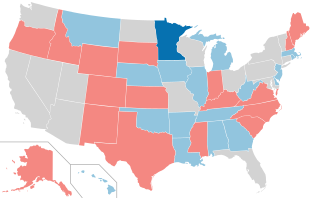
The 1990 United States Senate elections were held on Tuesday, November 6, 1990, with the 33 seats of Class 2 contested in regular elections. Special elections were also held to fill vacancies. The Democratic Party increased its majority with a net gain of one seat from the Republican Party. The election cycle took place in the middle of President George H. W. Bush's term, and, as with most other midterm elections, the party not holding the presidency gained seats in Congress. Until 2022, this had been the only election cycle where only one U.S. Senate seat flipped parties.

The 1984 United States Senate elections were held on November 6, with the 33 seats of Class 2 contested in regular elections. They coincided with the landslide re-election of President Ronald Reagan in the presidential election. In spite of the lopsided presidential race, Reagan's Republican Party suffered a net loss of two Senate seats to the Democrats, although it retained control of the Senate with a reduced 53–47 majority. Democrats defeated incumbents in Illinois and Iowa, and won an open seat in Tennessee, while Republicans defeated an incumbent in Kentucky.

The 1978 United States Senate elections were held on November 7, in the middle of Democratic President Jimmy Carter's term. The 33 seats of Class 2 were contested in regular elections. Special elections were also held to fill vacancies.

The 1966 United States Senate elections were elections on November 8, 1966, for the United States Senate which occurred midway through the second term of President Lyndon B. Johnson. The 33 seats of Class 2 were contested in regular elections. Special elections were also held to fill vacancies. With divisions in the Democratic base over the Vietnam War, and with the traditional mid-term advantage of the party not holding the presidency, the Republicans took three Democratic seats, thereby breaking Democrats' 2/3rds supermajority. Despite Republican gains, the balance remained overwhelmingly in favor of the Democrats, who retained a 64–36 majority. Democrats were further reduced to 63–37, following the death of Robert F. Kennedy in June 1968.
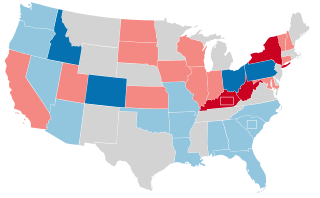
The 1956 United States Senate elections were elections for the United States Senate that coincided with the re-election of President Dwight D. Eisenhower. The 32 seats of Class 3 were contested in regular elections, and three special elections were held to fill vacancies. Although Democrats gained two seats in regular elections, the Republicans gained two seats in special elections, leaving the party balance of the chamber unchanged.

The 1954 United States Senate elections was a midterm election in the first term of Dwight D. Eisenhower's presidency. The 32 Senate seats of Class 2 were contested in regular elections, and six special elections were held to fill vacancies. Eisenhower's Republican party lost a net of two seats to the Democratic opposition. This small change was just enough to give Democrats control of the chamber with the support of an Independent who agreed to caucus with them, he later officially joined the party in April 1955.
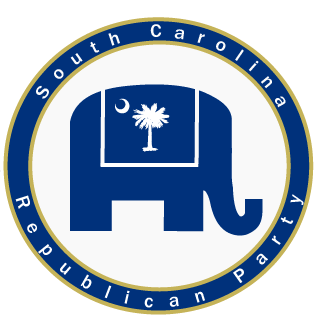
The South Carolina Republican Party (SCGOP) is the state affiliate of the national Republican Party in South Carolina. It is one of two major political parties in the state, along with the South Carolina Democratic Party, and is the dominant party. Incumbent governor Henry McMaster, as well as senators Tim Scott and Lindsey Graham, are members of the Republican party. Graham has served since January 3, 2003, having been elected in 2002 and re-elected in 2008, 2014, and 2020; Tim Scott was appointed in 2013 by then-governor Nikki Haley, who is also a Republican.

The 1954 South Carolina United States Senate election was held on November 2, 1954. Senator Burnet R. Maybank did not face a primary challenge in the summer and was therefore renominated as the Democratic nominee for the election in the fall. However, his death on September 1 left the Democratic Party without a nominee, and the executive committee nominated state Senator Edgar A. Brown as their replacement candidate. Many South Carolinians were outraged by the party's decision to forgo a primary election, and former Governor Strom Thurmond entered the race as a write-in candidate. He easily won the election and became the first U.S. senator to be elected by a write-in vote in an election where other candidates had ballot access. A Senate election where the victor won by a write-in campaign did not happen again until 2010.

The 1996 South Carolina United States Senate election was held on November 5, 1996 to select the U.S. Senator from the state of South Carolina. Popular incumbent Republican Senator Strom Thurmond, won re-election against Democratic challenger Elliott Springs Close for a seventh full term in office. The margin, however, was one of the closest in Thurmond’s 48-year Senate career. At the age of 93 years, 11 months and 3 days, Thurmond became the oldest person ever to be re-elected to the United States Senate. He eventually served out the entirety of what would be his final term and left the Senate on January 3, 2003, at age 100 years and 29 days.

The 1966 South Carolina United States Senate special election was held on November 8, 1966 to select the U.S. Senator from the state of South Carolina. The election resulted from the death of Senator Olin D. Johnston in 1965. Then Governor Donald S. Russell entered in a prearranged agreement with Lieutenant Governor Robert Evander McNair in which Russell would resign his post so that he could be appointed Senator. However, former Governor Fritz Hollings won the Democratic primary election and went on to beat Republican state senator Marshall Parker in the general election to win his right to fill the remaining two years of the unexpired term.

The 2002 United States Senate election in South Carolina was held on November 5, 2002. Longtime Republican incumbent Strom Thurmond decided to retire at the age of 100, becoming the first centenarian to ever serve in Congress; he later died in June 2003. Thurmond's record as the longest-serving Senator in U.S. history was later surpassed by West Virginia's Robert Byrd.
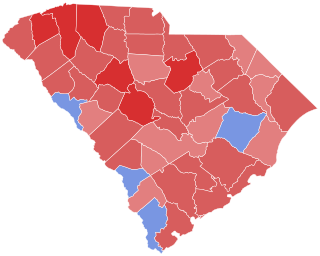
The 1990 South Carolina United States Senate election was held on November 6, 1990 to select the U.S. Senator from the state of South Carolina. Popular incumbent Republican U.S. Senator Strom Thurmond cruised to re-election against Democratic challenger Bob Cunningham.
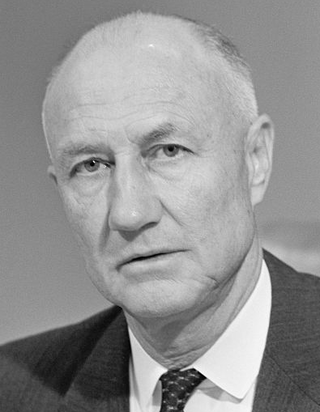
The 1966 South Carolina United States Senate election was held on November 8, 1966 to select the U.S. Senator from the state of South Carolina simultaneously with the special election to fill out the remainder of Olin D. Johnston's term.
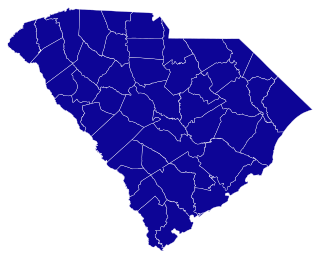
The 1956 South Carolina United States Senate special election was held on November 6, 1956, to select the U.S. Senator from the state of South Carolina simultaneously with the regular Senate election. The election resulted from the resignation of Senator Strom Thurmond on April 4, 1956, who was keeping a campaign pledge he had made in the 1954 election. Thurmond was unopposed in his bid to complete the remaining four years of the term.

The 1972 South Carolina United States Senate election was held on November 7, 1972 to select the U.S. Senator from the state of South Carolina. Popular incumbent Republican Senator Strom Thurmond easily defeated Democratic challenger Eugene N. Zeigler. This marked the first time that a Republican was re-elected Senator from the state, and the first time since 1872 when that person won consecutive elections.

The 1978 South Carolina United States Senate election was held on November 7, 1978, to select the U.S. senator from the state of South Carolina. Popular incumbent Republican Senator Strom Thurmond defeated Democratic challenger Charles D. Ravenel.

The 1950 South Carolina United States Senate election was held on November 7, 1950, to select the U.S. Senator from the state of South Carolina. Incumbent Democratic Senator Olin D. Johnston defeated Strom Thurmond in a bitterly contested Democratic primary on July 11 and was unopposed in the general election.

Electoral history of Strom Thurmond, 103rd Governor of South Carolina (1947–1951), United States Senator from South Carolina, 1948 States' Rights Democrats presidential nominee and President pro tempore of the United States Senate.





















